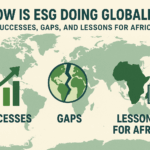
Environmental, Social, and Governance (ESG) principles have swiftly evolved from niche activities to central pillars of global business and finance in just over a decade. With trillions of dollars invested and most large firms embracing sustainability reporting, ESG shapes corporate strategy, investor decisions, and government policy worldwide. But beyond growth in interest and investment, how effective is ESG in meeting its sustainability goals?
ESG Growth and Impact
By 2020, globally managed sustainable investments reached $35 trillion, over one-third of professional assets, and they continue to grow robustly, projected to near $34 trillion by 2026. Today, about 90% of S&P 500 companies issue ESG reports, reflecting mainstream adoption. Corporate commitments to net-zero and independently verified climate goals are expanding, underscoring ESG’s entrenched role in business operations globally.[1]
Consumers increasingly prioritize sustainability, with over 83% expecting companies to actively drive ESG best practices. Institutional investors incorporate ESG factors in nearly 90% of investment decisions, signaling the financial industry’s recognition of sustainability as a material factor for long-term risk and opportunity management. ESG investment products represent a growing segment projected to account for over 20% of assets under management by 2026.[2]
Challenges in Reporting and Standards
A critical challenge for ESG is credible reporting. Investors and regulators demand transparent, verifiable disclosures, yet the ESG reporting landscape remains fragmented. Multiple frameworks exist, the Global Reporting Initiative (GRI), Task Force on Climate-related Financial Disclosures (TCFD), Sustainability Accounting Standards Board (SASB), and Europe’s Corporate Sustainability Reporting Directive (CSRD), among them.[3]
The International Sustainability Standards Board (ISSB), launched under the IFRS Foundation, has introduced baseline global standards (IFRS S1 and S2) intended to harmonize ESG disclosures worldwide. However, until harmonization is fully achieved, companies operating across multiple jurisdictions, especially between the U.S. and Europe, face significantly increased compliance burdens, with reporting costs almost 40% higher due to overlapping and misaligned requirements.[4]
Financial Flows and Greenwashing Risks
Capital flows towards green finance remain strong, with trillions invested in green bonds, sustainable funds, and transition financing. Shareholder activism has also risen, with global investors like BlackRock pressuring companies for greater ESG accountability.
However, greenwashing, where companies or funds claim ESG credentials without substantive action, persists as a systemic risk to ESG’s credibility.
Research indicates that as many as 41% of ESG-labelled funds fall short of genuine sustainability standards. Consequently, climate-related lawsuits targeting greenwashing have surged by 300% since 2022 as regulators worldwide step up enforcement to curb misleading claims.[1]
Regional Highlights
- Europe leads with comprehensive regulation, such as the CSRD, mandating detailed sustainability disclosures and third-party assurance. While this sets high global standards, associated costs and regulatory complexities provoke criticism, especially from smaller firms.[10][3]
- Asia shows rapid, though uneven, ESG adoption. Japan and Singapore have established stewardship codes and green bond hubs, while China expands its green taxonomy. Yet many emerging Asian economies lag in ESG integration.[2]
- The Americas are divided, with the U.S. facing political pushback against ESG initiatives in some regions, even as corporations embrace ESG for its long-term business value. ESG efforts in Latin America are deeply connected to pressing social and environmental issues like deforestation and water scarcity, integrating sustainability with social justice.[11]
Successes and Ongoing Struggles
ESG’s successes include expanding net-zero commitments, growing use of green financial instruments, and increasing transparency via mandatory disclosures in multiple jurisdictions. Yet, notable gaps remain: greenwashing undermines trust, multiple standards inflate compliance costs, enforcement remains inconsistent, and uptake among small and medium enterprises (SMEs) is limited, especially in emerging markets.[3]
Lessons for Africa and Ghana
Africa can leverage global ESG lessons:
- Harmonize reporting standards: Africa hosts over 30 ESG reporting templates, causing duplication and inefficiency. A unified African Green Taxonomy could streamline reporting and attract investment.
- Support SMEs: With SMEs dominating African economies yet lacking formal ESG systems or expertise, tailored, affordable training and tools are essential to broaden compliance and sustainable growth.
- Innovate finance: Blended finance models, combining public and private capital, can mobilize resources effectively. The African Development Bank’s $25 billion climate finance plan exemplifies such initiatives.
Ghana has already put in place important frameworks like the Sustainable Banking Principles and the ESG Disclosure Guidelines. These are strong foundations that can help businesses grow responsibly. But for Ghanaian companies to truly benefit, they need to see Environmental, Social, and Governance (ESG) practices not as just another set of rules to follow, but as a smart way to attract investors, drive innovation, and stay competitive.[4]
It’s against this background that the Integrating Climate Action and ESG Principles into Commercial Business Activities (ICACE) project is here. The project addresses the real challenges many businesses face due to the impact of climate change on their operations.
Spearheaded by the Climate and Development Knowledge Network (CDKN) in partnership with the Ghana Chamber of Commerce and Industry (GCCI) and supported by the International Development Research Centre (IDRC), the ICACE project focuses on empowering small and medium-sized enterprises, particularly those led by women and young people.
It provides training, supports policy development, and promotes advocacy to help these businesses build resilience, access new funding opportunities, and adopt sustainable practices that can secure their future in an increasingly climate-conscious world
ESG at a Crossroads
Globally, ESG is integral to corporate strategy, investor behavior, and regulatory policy. Although challenges like greenwashing and standard fragmentation threaten credibility, the ESG movement’s momentum is undeniable.
Africa and Ghana stand at a pivotal point: adopting ESG early and deliberately can unlock global capital, future-proof business models, and build essential trust in a rapidly changing world. Sustainability is not just a trend but the new currency of corporate credibility. Those who lead in ESG will thrive in the long term.[5]